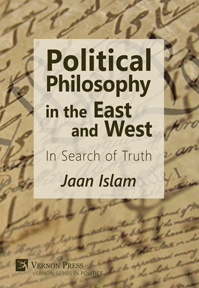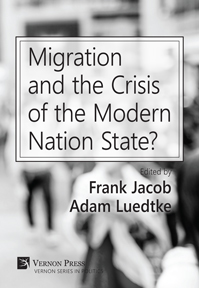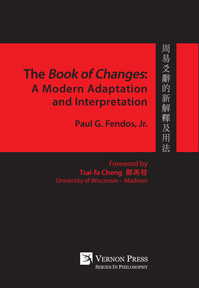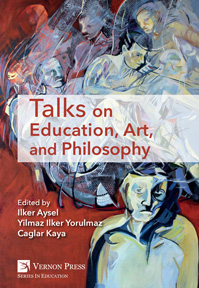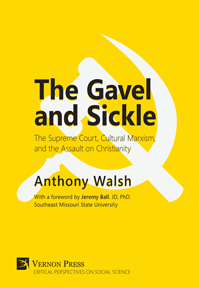Search
Browse
by Publication status
by Subject
Anthropology (26) Art (171) Business and Finance (38) Cognitive Science and Psychology (63) Communication and Journalism (51) Economics (116) Education (71) History (169) Human Geography (23) Interdisciplinary (43) Language and Linguistics (178) Law (16) Music Studies (18) Philosophy (222) Political Science and International Relations (127) Sociology (404) Statistics and Quantitative Methods (21)by Series
Series in Literary Studies (62) Series in Philosophy (57) Series in Education (49) Series in Sociology (42) Series in World History (31) Series in Politics (30) Bridging Languages and Scholarship (26) Series in Language and Linguistics (25) Cognitive Science and Psychology (20) Series in Philosophy of Religion (20) Series in American History (19) Series in Art (19) Critical Perspectives on Social Science (16) Series in Cinema and Culture (16) Curating and Interpreting Culture (15) Series on the History of Art (14) Series in Anthropology (13) Series in Critical Media Studies (13) Economics (13) Series in Business and Finance (12) Series in Music (12) Series in Performing Arts (9) Philosophy of Personalism (8) Series in Communication (8) Series in Law (8) Series in Economic Methodology (7) Series on Climate Change and Society (7) Classics in Economics (6) Series in Economic Development (6) Women's Studies (6) Philosophy of Forgiveness (5) Series in Built Environment (5) Series in Economic History (5) Series in Philosophy of Science (4) Series in Social Equality and Justice (4) Series on the History of Science (4) Serie en Sociología (3) Series in Contemporary History (3) Series in Creative Writing Studies (3) Series in Design (3) The Interdisciplinary Built Environment (3) Series in Heritage Studies (2) Series in Innovation Studies (2) Serie en Ciencias Políticas (1) Serie en Comunicación y Medios (1) Serie en Entorno Construido (1) Serie en Estudios Culturales (1) Serie En Estudios Literarios (1) Serie en Filosofía (1) Serie en Música (1) Series in Classical Studies (1) Series in Economics of Technological Change (1) Series in Philosophy of Race (1) Series in Urban Studies (1)by Language
English Spanishby Author
Browsing with filters
Political Philosophy in the East and West
In Search of Truth
November 2017 / ISBN: 978-1-62273-307-1Availability: In stock
240pp. ¦ $61 £46 €52
In the 21st century, amid converging global political, social, and economic forces we are questioning the fundamental values we hold true, driven by an antagonism between different schools of political philosophy—between left- and right-wing politics. This book provides a comprehensive analysis of western political philosophy and underlines the core principles of each argument. It then argues that neither have we solved nor do we have any pathway to eventually solve, the question of right and wrong—we are essentially moral relativists in disguise. In order to break out of this cycle of uncertainty, the book proposes a solution of knowledge-based cognition: policy based on a concrete and proven understanding of an absolute and certain body of truths. This requires an analysis and blending of non-western political philosophical traditions, such as those espoused by Islam and Confucianism. This book gives an original critique of western political philosophy and is the first book to engage in a reconstruction of Islamic political philosophy.
Migration and the Crisis of the Modern Nation State?
Edited by
Frank Jacob, Nord University, Norway
and Adam Luedtke, Queensborough Community College (CUNY)
Availability: In stock
284pp. ¦ $63 £51 €59
The anthology explores the interrelationship between migration and a supposedly existent crisis of the modern nation state. The argument of such a crisis is mainly used by the New Right to stimulate nationalist feelings and provoke hate and aggression. We, in contrast to this perception, argue that from a historical and current perspective, migration is not endangering the nation state, but rather changing the idea of a nation itself by redefining it. In historical as well as current case studies, the authors determine the political dangers of right wing demagogues, while emphasizing the chances, immigration is offering the progress of the nation state. While it will be discussed how nationalism is impacting on the perception of migration, we also want to emphasize how it is perceived by the people in the specific regions, which are either confronted with migration or those which are not. The authors for the volume come from different fields, namely history and political sciences, and are consequently able to offer the reader a broad insight into the historical roots and the current consequences nationalism had or has on the perception and the local as well as global policies towards migration. The analysis of particular immigrant groups (e.g. North Koreans in post-war Korea, South Asians in the Emirates, Middle Eastern refugees in Europe, Hispanics in the United States) as well as a close reading of crisis related media (newspapers and other media in Europe and the US) will, all in all, establish a broad perspective, due to which the reader will be able to compare and connect the national events to a larger global picture.
The Book of Changes: A Modern Adaptation and Interpretation
Paul G. Fendos, Minnesota State System
Availability: In stock
290pp. ¦ $63 £47 €53
The Book of Changes: A Modern Adaptation and Interpretation attempts to breathe new life into the Book of Changes by making it relevant to the present time and day. It does so by using archaeological evidence to trace the origins of the Book of Changes, starting with numeric trigrams and hexagrams, making its way up to early divination manuals, and ending with the oldest extant version of the Books of Changes—usually referred to as the ‘received version.’ It also explains the development of the Book of Changes from a divination manual into a philosophical text dealing with change. However, its main focus is on delineating sixty-four patterns of change in the Book of Changes, patterns based on novel metaphorical interpretations of the line texts in the Book of Changes that serve as the foundation for a new handbook on change. Each metaphorical interpretation consists of 1) a hexagram and the Chinese character associated with it, 2) a ‘description’ of the hexagram, 3) the Chinese characters for the line texts, 4) translations of the line texts, 5) a general interpretation of the line texts based on those translations, 6) and some explanatory notes that attempt to clarify each interpretation. Translations and the interpretations based on those translations reference Traditional and Modernist understandings of the line text materials, ancient texts/dictionaries/lexicons from the period when the Book of Changes was compiled, and the ideas of the author as he works to create a new Chinese ‘philosophy of change,’ complete with examples of how it can be adapted in modern-day life. The clear and concise general introduction to the Book of Changes that is incorporated into this work, the many interpretations of the line texts contained in it, and a popular philosophical content make this book a welcome addition to the field and will attract interested scholars and teachers, engage business people or those looking to better understand Chinese culture, and appeal to those focused on spirituality and holistic living.
Talks on Education, Art, and Philosophy
Edited by
İlker Aysel, Mugla Sitki Kocman University, Turkey et al.
Availability: In stock
164pp. ¦ $56 £43 €48
This book is a collection of reflections on the state of education, art and philosophy, principally in modern Turkey. The contributed chapters include: the identity and social roles of teachers; foreign experts’ opinions concerning the structure of the Turkish education system; repercussions of recent Turkish education policies; a provocative essay on the underdetermination of scientific theories; the role of political power on state theatres in Turkey; the relationship between society and art as seen through the lens of theater; the connections between meliorism and other concepts philosophical such optimism and messianism.
The Gavel and Sickle: The Supreme Court, Cultural Marxism, and the Assault on Christianity
Anthony Walsh, Boise State University
Availability: In stock
258pp. ¦ $61 £50 €58
This book addresses the benefits of Christianity for all, the degradation of our culture since the 1950s, the pernicious effects that cultural Marxism has had on Western cultures, and the loss of religious freedom as the Founders envisioned it due to a number of Supreme Court rulings. We cannot understand the culture war and cultural debasement until we understand cultural Marxism. Cultural Marxism has been "hiding in plain sight" since the 1930s with the immigration to the United States of a cadre of intellectuals from Germany who brought with them the folderol of critical theory, political correctness, gender neutrality, radical feminism, and moral relativism. This intellectual moonshine is designed to weaken family structure and individual morality, and it has worked. The ultimate purpose of cultural Marxism is to destroy Western civilization from within. This goal is clearly and unambiguously stated in their books and articles. In numerous places in these books and articles, cultural Marxists are adamant that if socialism is ever to come to America the two epicenters of Western morality, the family and Christianity, will have to be destroyed by slow, stealthy, and incremental attacks on them. They have been aided in their efforts by anti-Christian rulings by the United States Supreme Court since the 1940s. I do not claim in any sense that the Supreme Court is engaged in a conspiracy with cultural Marxists. Their rulings have been based on a reading of the Establishment Clause of the First Amendment that its authors would not recognize, and have used this clause to eviscerate the Free Exercise Clause—America’s “first freedom.” The Court has purged Christianity from the public square, and in doing so it has unwittingly helped the cultural Marxist agenda by spiritually disarming America.

